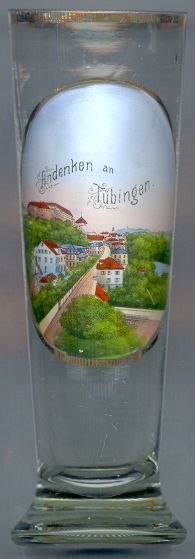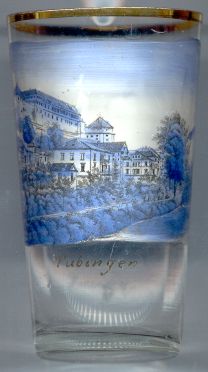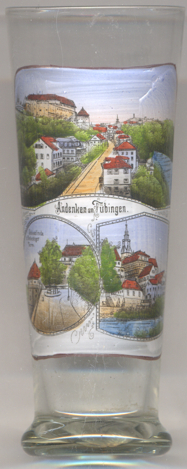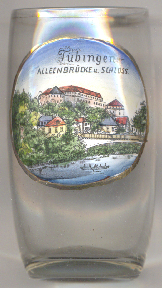

|
| DEUTSCHLAND | GERMANY |
| Bundesland: Baden-Württemberg | |
| Regierungsbezirk: Tübingen | |
| Landkreis: Tübingen |
Tübingen is situated at an elevation of 337 m on the slopes of the river Neckar valley in the heart of Germany's state of Baden-Württemberg. The castle Twingia was first mentioned in a document in 1078. The founders of the castle called themselves alter this castle and obtained the rank of count palatines in the mid-12th century. Around 1231 Tübingen was first mentioned as a civitas, a town. During the early 14th century the power of the counts of Tübingen declined, and in 1342 they were forced to sell the town to the counts of Württemberg. For centuries Tübingen remained the second-largest city in Württemberg (after Stuttgart) and after the foundation of the Duchy of Württemberg it became its second residence town. Duke Ulrich of Württemberg granted the town important privileges in 1514.
 Perhaps the most important event in Tübingen's history was the foundation in 1477 of the university by Duke Eberhard im Bart. The university
soon became renowned throughout the German countries. Between 1520 and 1534 the Duchy of Württemberg was ruled by Austria.
After his return in 1534 Duke Ulrich introduced the Reformation in his country. The intellectual importance was further enhanced by the
foundation of the Protestant School in 1536 and of the Collegium Illustre in 1594. The most famous pupils of the Protestant School
were the philosopher Georg Wilhelm Friedrich Hegel, the poet Friedrich Hölderlin, and the philosopher Friedrich Wilhelm Joseph von Schelling,
who attende the school between 1877 and 1795. The Collegium Illustre remained a most important cente of education of the Protestant nobility of
Europe until its temoprary closure in 1628. The Thirty Years' War (1618–1848) was a time of extreme hardship for the town.
After the war the university was reduced to a mediocre academy and after the foundation of the "Hohe Karlsschule" (Charles Academy) in Stuttgart
and its elevation to a university in 1781, the university of Tübingen was in danger of being closed altogether. This was prevented only because
the university at Stuttgart was closed in 1794 after the death of Duke Karl Eugen.
Perhaps the most important event in Tübingen's history was the foundation in 1477 of the university by Duke Eberhard im Bart. The university
soon became renowned throughout the German countries. Between 1520 and 1534 the Duchy of Württemberg was ruled by Austria.
After his return in 1534 Duke Ulrich introduced the Reformation in his country. The intellectual importance was further enhanced by the
foundation of the Protestant School in 1536 and of the Collegium Illustre in 1594. The most famous pupils of the Protestant School
were the philosopher Georg Wilhelm Friedrich Hegel, the poet Friedrich Hölderlin, and the philosopher Friedrich Wilhelm Joseph von Schelling,
who attende the school between 1877 and 1795. The Collegium Illustre remained a most important cente of education of the Protestant nobility of
Europe until its temoprary closure in 1628. The Thirty Years' War (1618–1848) was a time of extreme hardship for the town.
After the war the university was reduced to a mediocre academy and after the foundation of the "Hohe Karlsschule" (Charles Academy) in Stuttgart
and its elevation to a university in 1781, the university of Tübingen was in danger of being closed altogether. This was prevented only because
the university at Stuttgart was closed in 1794 after the death of Duke Karl Eugen.
During the 19th century new faculties
were added to the university: Germany's first faculty of political sciences was founded in 1817, Germany's first science faculty followed in 1863.
At the turn of the 18th to the 19th century Tübingen again became a highly influencial centre of intellectual life, called "Sedes Musorum" and
"Neckar Athens". The poets and writers Ludwig Uhland, Wilhelm Hauff, Gustav Schwab, Justinus Kerner and Eduard Mörike became famous
far beyond Württemberg. Although Tübingen was connected to the railroad system in 1861 it only grew moderately because no
major industries moved in. After World War II, Tübingen became the capital of the state of Württemberg-Hohenzollern
until the foundation of Baden-Württemberg in 1952. There is a well-known saying about the town: "Tübingen does not have a university, it is a university".
At a population of 84,000 (1992) there are about 26,000 students in Tübingen.


 Hohentübingen castle [top left] was first mentioned in 1078 as "castrum Alemannorum, quod Twingia vocatur".
Most parts of the castle as we see it today were built in the 16th century. Today the castle is home of departments of cultural history of the university.
Their collections are open to the public.
Hohentübingen castle [top left] was first mentioned in 1078 as "castrum Alemannorum, quod Twingia vocatur".
Most parts of the castle as we see it today were built in the 16th century. Today the castle is home of departments of cultural history of the university.
Their collections are open to the public.
The  Fünfeckturm ('Pentagon Tower') [near left, no. 3472: bottomm left picture]
is the southeastern tower of castle Hohentübingen. It was built in 1667 in place of a higher, round tower that had been
blown up by the French in 1647 in the course of the Thirty Years' War (1618–1648). In the 19th century it served as
a prison. Since 1997 it is home of the Department of Ethnology of the Castle Museum.
Fünfeckturm ('Pentagon Tower') [near left, no. 3472: bottomm left picture]
is the southeastern tower of castle Hohentübingen. It was built in 1667 in place of a higher, round tower that had been
blown up by the French in 1647 in the course of the Thirty Years' War (1618–1648). In the 19th century it served as
a prison. Since 1997 it is home of the Department of Ethnology of the Castle Museum.
[https://www.tuepedia.de/wiki/Füfeckturm]

The  castle gate was created in splendid Renaissance style in 1606/1607, presumably after a design by
the architect Heinrich Schickhardt.
castle gate was created in splendid Renaissance style in 1606/1607, presumably after a design by
the architect Heinrich Schickhardt.
[https://www.tuepedia.de/wiki/Alleenbr%C3%BCcke]

The picture on glass no. 4765 [near left] is labeled Alleenbrücke und Schloss.
The  Alleenbrücke
Alleenbrücke
[https://www.tuepedia.de/wiki/Alleenbr%C3%BCcke]
![[scale]](lineal.jpg)